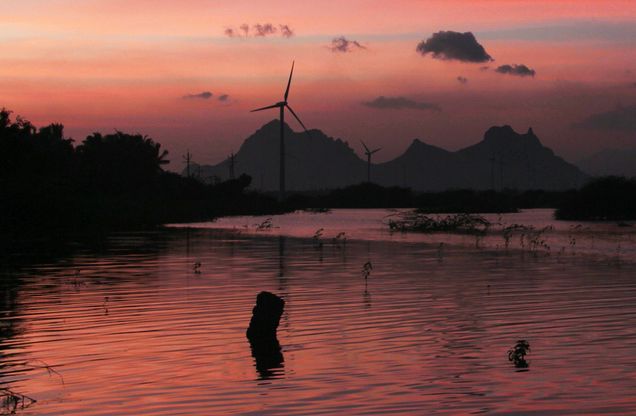Global Economic Governance
The Global Economic Governance Initiative (GEGI) advances policy-oriented research to enable the international financial architecture to foster financial stability, human well-being and environmental sustainability across the globe.
RESEARCH SPOTLIGHT

With just six years until 2030, there is an urgent need to unlock investments and mobilize affordable climate finance in a fiscally sound and financially stable manner.
The International Monetary Fund (IMF) has a vital role to play, and proposals to reform the international financial architecture – whether the Bridgetown Initiative, the Paris Pact for People and Planet or the Nairobi Declaration – all involve reforms to the IMF.
Yet, despite notable recent strides, ambition to integrate climate at the Fund remains limited. A transformation of the IMF is necessary for aligning the international financial architecture with shared development and climate change goals.
A new report from the Task Force on Climate, Development and the IMF pushes for a faster and deeper evolution of the IMF that is both development-centered in its approach to climate and embraces an investment push as a priority goal. It presents three core policy recommendations animated by an IMF 2030 Action Agenda, comprised of concrete reforms to be implemented over the next 12 months.
Read the Report Read the BlogExplore the research programs
GEGI Publications and News
Subscribe to the GEGI Mailing List
-
Global Financial Safety Net Tracker Database Methodology Guidebook, 2026
January 28, 2026The Global Financial Safety Net (GFSN) is a set of institutions and mechanisms that provide insurance against crises and financing to mitigate their impacts. It has four main elements: countries’ own international reserves; bilateral swap arrangements whereby central banks exchange... [ More ]
-
USMCA and the Need for a “Second Story” of Mexican Wages and Household Incomes
January 28, 2026The current trade war and tensions with the US pose many challenges for Mexico, but at the same time they provide both an impetus and a strategic opportunity to make progress on the longstanding and interwoven problems of low wages, [ More ]
-
Geopolitics on the Rise, IMF on the Decline: Insights from the Updated Global Financial Safety Net Tracker
January 26, 2026By Laurissa Mühlich, Marina Zucker-Marques and Barbara Fritz In an era of mounting debt pressures, climate shocks and volatile international trade policies, timely and reliable financial resources are critical to stabilize economies without sacrificing essential public spending and development goals. To address this, [ More ]
-
What the EU’s New Compulsory Licensing Policy Signals for Global Health Governance and Flexibilities for Middle-Income Countries
January 23, 2026By Rachel Thrasher, Deborah Gleeson, Brook K. Baker, Veronika Wirtz, Warren A. Kaplan and Brigitte Tenni Global and regional crises call for rapid, flexible solutions, especially when it comes to access to lifesaving medicines in a health emergency. On December 30, 2025, [ More ]
-
International Investment Pushes Past and Present: Introducing the Blog Series
November 21, 2025By Tim Hirschel-Burns Political winds may have shifted in some major powers, but reality has not: a global investment push is needed. Only 18 percent of the Sustainable Development Goals (SDGs) are on track, setting the world on a course for... [ More ]
-
Chart of the Week: Debt Distress: The Hidden Barrier to Scaling Up Adaptation Finance
November 20, 2025By Rishikesh Ram Bhandary and Tim Hirschel-Burns As negotiations at the 30th United Nations Climate Change Conference (COP30) in Belém, Brazil go down to the wire, one of the key topics awaiting resolution is adaptation finance. Adaptation finance is geared towards... [ More ]
-
Report on Compulsory Licensing Provisions in the National Patent Legislation of 15 Middle-Income Countries: A Content Analysis and Recommendations
November 17, 2025The access to medicines discourse over the past 30 years has highlighted the myriad of obstacles to access experienced by low- and middle-income countries (LMICs). Already plagued by over-taxed health services systems, a limited health care workforce and other resource... [ More ]
-
Chart of the Week: How Much Should Multilateral Development Banks Contribute to the Baku to Belém Roadmap to $1.3 Trillion?
November 13, 2025By Rishikesh Ram Bhandary and Marina Zucker-Marques Last week, the 30th United Nations Climate Change Conference (COP30) Presidency published the Baku to Belém Roadmap to $1.3T, which brings together a range of actions and reform measures that could help mobilize $1.3... [ More ]
-
Defunding the Amazon: Mapping ISDS Risk from the Oil and Gas Sector in Amazonian Countries
November 10, 2025The protection of the Amazon is a central theme of the 30th Conference of the Parties (COP30) in Belém, Brazil. However, efforts to ensure that the Amazon is defended are at risk of instead being defunded—by investor-state dispute settlement (ISDS). [ More ]
-
Desvendando o “Pecado Digital”: ForexTech e as Novas Fronteiras da Volatilidade Cambial
November 10, 2025Por Pedro Perfeito da Silva e Marina Zucker-Marques A expansão das FinTechs—inovações tecnológicas em serviços financeiros—está mudando a forma como pessoas e empresas poupam, investem, realizam pagamentos, acessam crédito, e gerenciam suas finanças. Enquanto estudos destacam o potencial das FinTechs para... [ More ]
